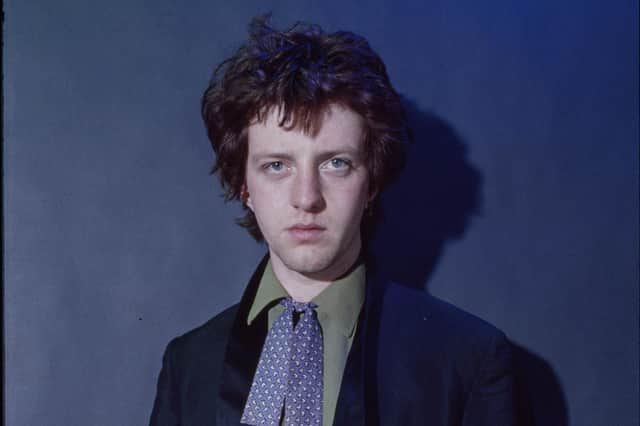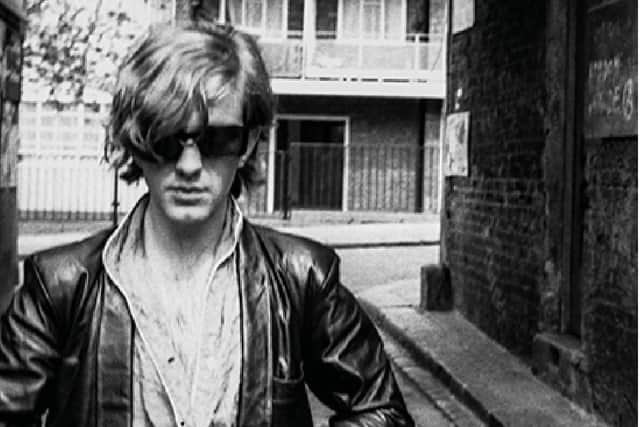Rory Sullivan-Burke on his biography of guitarist John McGeoch


“I was listening to a bit of (Siouxsie and) the Banshees at the time and thought, I’d really like to read a book about John McGeoch,” he recalls. “I was such a massive Magazine and Banshees fan, I thought I’m sure that would be a really interesting story. I assumed that there had to be a book already written about him, but searching on my phone I realised my God, there isn’t a book about someone who was, to my mind anyway, just about the most influential and important post-punk guitarist. It seemed crazy to me.”
Despite never having written before, Sullivan-Burke, who by day is a care worker in Leeds supporting adults with learning disabilities, resolved to pen the book himself. While still on the same train journey, he searched on social media for McGeoch’s daughter Emily. “I got in touch with her and said, ‘Look I’d love to do it. If you’re OK with it, let’s talk’ kind of thing and she got back to me a couple of weeks later and said, ‘Absolutely, go for it’.”
Advertisement
Hide AdAdvertisement
Hide AdCompiling the book as the UK was still in lockdown, Sullivan-Burke found a large number of musicians who had worked with McGeoch in the bands Magazine, Siouxsie and the Banshees, The Armoury Show and Public Image Ltd were willing to talk to him about the guitarist, who died of sudden unexpected death in epilepsy on March 4, 2004 aged 48.
“Saying it’s a lockdown book is important because people were available, people I could never have dreamed,” he says. “I had no contacts, I didn’t know anybody, I’m just a guy who loves music. But I got in touch with managers and record companies, different things, and said, ‘Look, can I speak to these people?’ You have to be a bit persistent, but I found that they were just so willing to get involved.
“Johnny Marr was great because he also wrote the foreword for the book, but then there was somebody like Siouxsie who hadn’t given an interview for eight or nine years, but here she was. We spoke so many times, I could call or text her whenever I wanted if I had any questions or even just to chat about things like the football results, then we ended up going out for lunch.
“It was an absolute labour of love, speaking to all these people, meeting all these people and just hearing how much respect and admiration they had for John and his talent, and who he was as a human.”
Advertisement
Hide AdAdvertisement
Hide AdThe Light Pours Out of Me is full of insights into McGeoch’s time with Magazine, the Banshees, Visage, Teh Armoury Show and PiL. researching the book was a voyage of discovery for Sullivan-Burke. “I knew nothing other than the fact that I loved his work, I loved the music, I thought he looked really cool onstage, but I didn’t know anything about him as a personality,” he says. “I think once you got to know that side of him, the caring side, he was very intelligent and erudite, he knew how to use words, he was also quite a fiery character, which kind of appealed because working with people like Siouxsie and John Lydon and Richard Jobson you need to be able to stand your ground.


“But I think the biggest thing that surprised me was it made me question myself as a father – and I didn’t expect that from writing a book about a lead guitarist – but his example of just how involved he was, he was a real hands-on dad, and that really impressed me. And of course the care work side (after leaving music in the 1990s, McGeoch worked as a nurse in Sheffield), wow.
“To have had the career that he’d had and for it to have kind of finished, really, and he had to do something else, but to choose to do that is probably quite humbling because it’s not glamorous work and it’s not really very desirable work if we’re being honest about it, but for him to do it and to do it as lovingly as he did I think spoke volumes. He was an incredibly interesting man and had a lot of strings to his bow. You didn’t want it to end, you just wanted to keep interviewing people because there was always more stuff, you felt like you could have gone on and on but it had to end somewhere.”
McGeoch had studied art at Manchester Polytechnic and could have gone on to pursue a career as a painter. But Sullivan-Burke believes that being introduced to Howard Devoto after he had left Buzzcocks ultimately swayed him in favour of music. “That circumstance or that bit of fate took him then into another direction, but amazingly while they were recording Real Life, the debut Magazine album, John was still finishing off his degree,” he says. “He’d be travelling to Ridge Farm (studio in Surrey) to do the recording and then going back up north to Manchester to do his work for his degree and came out with a first, which is pretty impressive with all that was going on for him at that time.”
Advertisement
Hide AdAdvertisement
Hide AdThe combination of complexity and economy in McGeoch’s playing is what makes it stand out, Sullivan-Burke feels. “Certainly for that era, those bands, I don’t want grandiose, twiddly-diddly guitar solos. You want to see just how creative are you, and I think it was Mark Arm of Mudhoney who said to me, the thing that John had, which was like a secret ingredient, was that he knew how to utilise space within a song, and I thought, that’s absolutely right. He was that guy who could pull back just at the right moment and somebody else might go over the top and he’d just let the song breathe and then come back in and it be all the more powerful for that.


“I think when you’re looking for chart success, and that would be primarily when he was with Siouxsie, the way that his guitar parts weave in and around her vocals, but also work so beautifully with Budgie’s drumming as well – to listen to Juju as an album, you really get that sense not just of music that is very interesting and a little subversive but it also had a catchy kind of pop appeal to it, which I think is a real talent, particularly branching out from that music, which started with punk which wasn’t the most complicated or sophisticated kind of music, but to take the Banshees on this journey and really elevating their sound, putting them on a platform which set them on the path for the rest of their careers, even without John after he’d been removed from the band.”
First published in hardback by Omnibus last year, Sullivan-Burke’s book The Light Pours Out of Me garnered critical praise and sold out. A paperback edition is due in February 2025 to coincide with a documentary feature film based on the biography which will be directed by Paul Sng, maker of the acclaimed Poly Styrene biopic, I Am a Cliché.
Sullivan-Burke says: “The response has been encouraging and I’m just really delighted that you go on the internet now and you see John’s name cropping up so much more. You go on to YouTube and see guitarists giving lessons on how to play like McGeoch. I think that’s great because for the longest time since his death, and even before, he just seemed to have fallen off the radar a bit.
Advertisement
Hide AdAdvertisement
Hide Ad“But now you hear a lot of people talking about him, like Jonny Greenwood from Radiohead, Johnny Marr and John Frusciante (of the Red Hot Chili Peppers) and you think great, he’s getting that recognition which leads into the whole thing for the feature documentary, which is mind-blowing but very pleasant.”
The Light Pours Out of Me is published by Omnibus Press, priced £20.
For details on the crowdfunding campaign for the film, visit: https://www.kickstarter.com/projects/invisiblebritain/john-mcgeoch-the-light-pours-out-of-me
